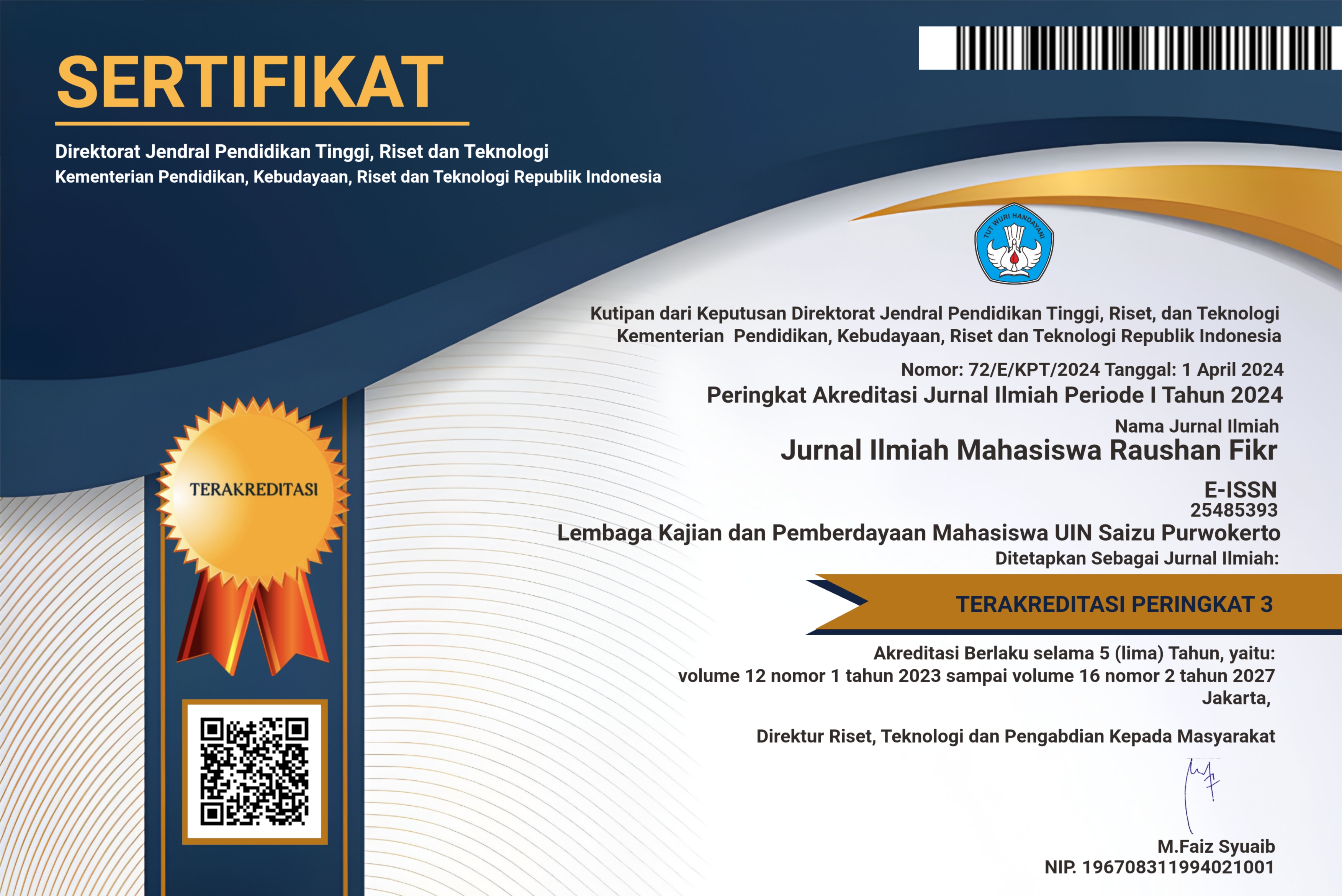FORMULASI KONSEP MODERASI ISLAM BERBASIS KEINDONESIAAN DALAM MEREDUKSI RADIKALISME AGAMA DI INDONESIA (KAJIAN EPISTEMOLOGIS-HISTORIS)
DOI:
https://doi.org/10.24090/jimrf.v8i1.3054Kata Kunci:
Moderation of Islam, Integration-Interconnection, Nationality Jurisprudence, Radicalism, Islam rahmatan lil alamin.Abstrak
The religious phenomenon of Islam in post-reform Indonesia is thought to have experienced extremism and radicalism. The explosion of terrorism in the name of Islam that occurred between 1998 and 2018 made the face of Indonesian Islam in the world. Whereas in fact Islam in Indonesia is Islam that promotes moderate principles (tawassuth / washatiah) in preaching, namely taking a middle ground between the opposite two extreme poles. Da’wah method of Washatiyatul Islam or Moderation of Islam is a method of da’wah that emphasizes the Islamic values of Rahmatan Lil Alamin. Da’wah is friendly with tradition, so it can grow in a multicultural and multi-religious society. It is this characteristic of accommodative Islam that is the stronghold of the prevention of radical religious ideas. This article using the epistemological-historical-holisitic approach wants to explore the concept of moderation of Islam in the context of the Indonesian nation and the shallowness of religious reasoning. As a result, none of the strong references say that the spread of Islam in ancient Archipelago was by radical means. The history of Islam in the archipelago has struggled with diverse localities. Islam is not present to break down or chop away existing traditions and local culture, but try to dialect with the context in which Islam is located. Because of its flexible nature, Islam is able to survive and develop so that it raises a new Islamic style that is unique and does not exist in any part of the world.Unduhan
Referensi
Asrori, Ahmad. Radikalisme di Indonesia (Antara Historisitas dan Antropisitas), Jurnal Studi Agama dan Pemikiran Islam. Volume 9. Nomor 2.
Choirul Ummah, Sun. 2012. Akar Radikalisme Islam di Indonesia. Humanika, No. 12.
Darajat, Zakiya. 2017. Muhammadiyah dan NU. Hayula: Indonesian Journal of Multidiciplinary Islamic Studies, Vol 1 No. 1.
Darlis. 2017. Mengusung Moderasi Islam di Tengah Masyarakat Multikultural. Jurnal Rausyan Fikr. Vol. 13. No. 2.
Hayatmoko. 2014. Etika Politik dan Kekuasaan. Jakarta: Kompas.
Hisbullah. Muhammad. 2018. Dakwah Harakah, Radikalisme dan Tantangannya di Indonesia. Misykat Al-Anwar, Vol. 9, No. 2.
Khoirurrijal. 2017. Islam Nusantara Sebagai Counter Hegemoni Melawan Radikalisme Agama di Indonesia. AKADEMIKA. Vol. 22. No. 01.
Muhaimin. 2005. Studi Islam dalam Ragam Dimensi & Pendekatan. Jakarta: Kencana.
Muhammad Amin, Abd. Rauf. 2014. Prinsip dan Fenomena Moderasi Islam dalam Tradisi Hukum Islam. Jurnal ‘’Al-Qalam’’. Volume 20.
Mukti Ro’uf, Abdul. 2017. Mengurai Radikalisme Agama di Indonesia Pasca Orde Baru. Ulumuna. Vol. 9, No. 1.
Nasution, Harun. 1995. Islam Rasional. Bandung: Mizan.
Nur, Afrizal. 2015. Konsep Washathiyah dalam Al-Qur’an; (Studi Komparatif antara Tafsir Al-Tahrir wa At-Tanwir dan Aisar At-Tafasir. An-nur. Vol. 4 No. 2.
Sunanto, Musyrifah. 2014. Sejarah Peradaban Islam Indonesia. Jakarta: PT Raja Grafindo.
Supriyanto. 2015. Perdamaian dan Kemanusiaan dalam Pandangan Islam. Jurnal Studi Agama dan Pemikiran Islam. Volume 7. Nomor 2.
Tahir, Masnun. 2015. Wacana Fikih Kebangsaan dalam Penanggulangan dan Pencegahan Radikalisme di Lingkungan Kampus di NTB, As-Syariah, Vol. 49. No 2.
Wasik, Moh Ali. 2016. Islam Agama Semua Nabi dalam Perspektuf Al-Qur’an. Esensia. Vol 17 No. 2.
Yusuf, Achmad. 2018. Moderasi Islam dalam Dimensi Trilogi Islam (Akidah, Syariah, dan Tasawuf). Jurnal Pendidikan Agama Islam. Volume 3. Nomor 2.
Zuhdi. 2017. Radikalisme Agama dan Upaya Deradikalisasi Pemahaman Keagamaan. AKADEMIKA: Jurnal Pemikiran Islam. Volume 22. No. 01.
Unduhan
Diterbitkan
Cara Mengutip
Terbitan
Bagian
Lisensi

Artikel ini berlisensiCreative Commons Attribution-NonCommercial-ShareAlike 4.0 International License.
Authors who publish with this journal agree to the following terms:
- Authors retain copyright and grant the journal right of first publication with the work simultaneously licensed under a Creative Commons Attribution-NonCommercial-ShareAlike 4.0 International License that allows others to share the work with an acknowledgement of the work's authorship and initial publication in this journal.
- Authors are able to enter into separate, additional contractual arrangements for the non-exclusive distribution of the journal's published version of the work (e.g., post it to an institutional repository or publish it in a book), with an acknowledgement of its initial publication in this journal.
- Authors are permitted and encouraged to post their work online (e.g., in institutional repositories or on their website) prior to and during the submission process, as it can lead to productive exchanges, as well as earlier and greater citation of published work (See The Effect of Open Access).
















